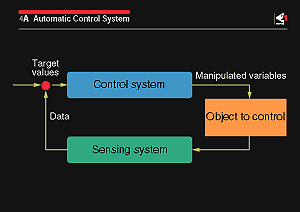Producing steel products which
meet the needs of customers requires not only smelting, refining,
casting and working but also a number of related techniques.
Important among these are techniques for analyzing composition,
and for measuring and controlling the processes involved. As
an example of advances in analytical techniques related to steel,
the accurate determination of elements in real time has been
made possible by instrumental analysis. With continuing progress
in the production of high-purity steel, techniques to analyze
the micro elements present in concentrations at the ppm level
or less have become increasingly important.
Measuring techniques involve monitoring chemistry, temperature,
pressure, and dimensions with sensors, and processing the sensor
signals in real time. Elimination of noise, and computation,
data transmission, and recording in memory can easily be achieved
as a result of progress in the digitization of signals. As the
next step, advances in the technique called sensor-fusion are
desired to make it possible to gather high-level information
which is unobtainable from one sensor alone, but is available
by combining the data provided by multiple sensors.
Control techniques are indispensable to obtain consistent quality
in mass production. Control involves changing the present state
to achieve the desired state by carrying out appropriate operations.
The system by which automatic control is conducted consists of
the process to be controlled, the control system, and the sensing
system, as shown in the figure. The values obtained for process
variables which have been recognized and measured by sensing
are then compared with the target values. Differences are converted
by the control system into the variables and transmitted to the
operation terminal which controls the specific process on the
basis of variables, the result again being monitored by the sensing
system. This cycle is conducted repeatedly. The area of science
and engineering used to design the most effective control system
is called control engineering, and aims at applying the optimum
control system and sensing system following a complete analysis
of the process being controlled.
Control theory is widely applied to centrally control the utilities
used in steel works, as well as the whole process ranging from
treating the raw materials to producing the final products. |
|
 |
 |
 |
|
|